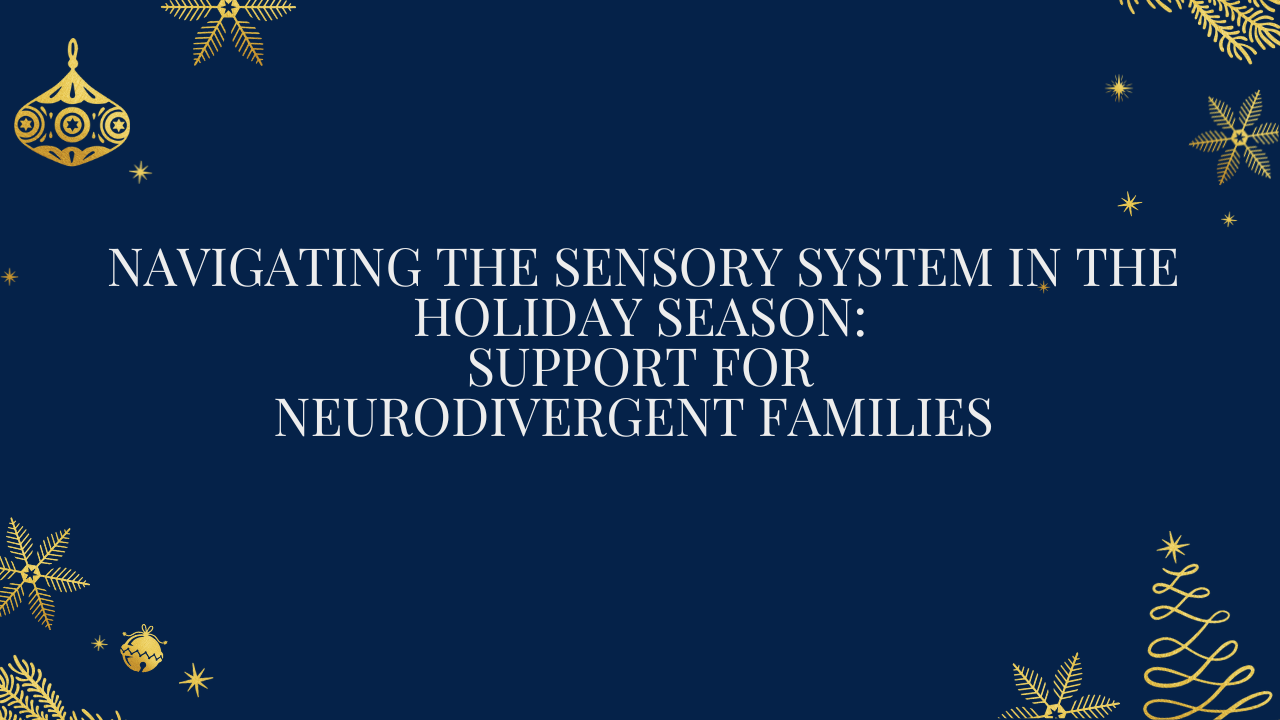
NAVIGATING THE SENSORY SYSTEM IN THE HOLIDAY SEASON: SUPPORT FOR NEURODIVERGENT FAMILIES
Nov 28, 2024A guest blog, written by Helen Edgar (Autistic Realms) for ThePDASpace, Nov 2024 inspired by the webinar delivered by Munira Adenwalla, Paediatric Occupational Therapist, OT4kids.
The holiday season is meant to be a time of joy and celebration, but for families with neurodivergent children, it can also bring unique challenges. The abundance of new and overwhelming sensory experiences can lead to stress and sensory dysregulation for many children and also their parents. Here are some tips and insights to help ensure your holiday season is enjoyable and as stress-free, low-demand as possible for everyone.
Understanding Sensory Processing
Each child's sensory system is unique, and their needs may fluctuate throughout the day. Sensory processing involves both external senses (like taste, touch, sight, smell, and hearing) and internal senses (such as proprioception - which is related to body awareness, vestibular - related to balance and coordination and interoception - related to internal systems eg if hot/cold / need toilet / in pain or hungry). Recognizing whether your child is over-responsive or under-responsive to certain sensory inputs can help tailor strategies to support them effectively.
The Cup Analogy
An effective way to conceptualize sensory processing is through the "cup analogy." If your child has a "big cup," they might seek extra sensory input. Conversely, a "small cup" indicates a lower capacity for sensory input, leading to withdrawal or avoidance of certain sensory stimuli and events. Understanding your child's sensory profile helps in balancing their needs and can help reduce meltdowns and shutdowns caused by sensory overwhelm or dysregulation.
Strategies for a Sensory-Friendly Holiday
- Rest and Routine: Schedule home days before and after major events to allow recovery time. Maintain familiar routines where possible to provide comfort and reassurance.
- Gift Planning: Some children may not enjoy surprise gifts. Involve them in the wrapping process or let them open presents at their own pace even in the lead-up to the big day to help reduce anxiety and overwhelm.
- Environmental Adjustments: Create a low-demand environment to foster a sense of safety and control. Think about how lighting, sounds, smells, and busyness may all impact your child and what you can do to reduce the things that may feel too much. Using ear defenders, having a quiet
- Engagement and Choice: Involve your child in planning holiday activities as much as possible. This inclusion can make them feel heard and respected, reducing anxiety and enhancing enjoyment and for PDAers can give a much-needed sense of autonomy and control over the situation.
- Comfort and Familiarity: Ensure that comfortable clothing and familiar foods are available. Bringing along familiar toys or comfort items can also help provide reassurance and reduce anxiety.
Crafting a Joyful Holiday Experience
We have found the key to a successful sensory holiday lies in understanding and honouring your child's unique needs and also giving yourself a bit of time as a parent/carer to rest and recover by yourself as much as possible. By creating an environment that respects your child’s sensory processing requirements, you can help foster a joyful and more sensory enjoyable holiday season. Remember, it's all about balance – doing more of what recharges and less of what drains the sensory system can make a huge difference. Here's to a happy holiday for you and your family!


